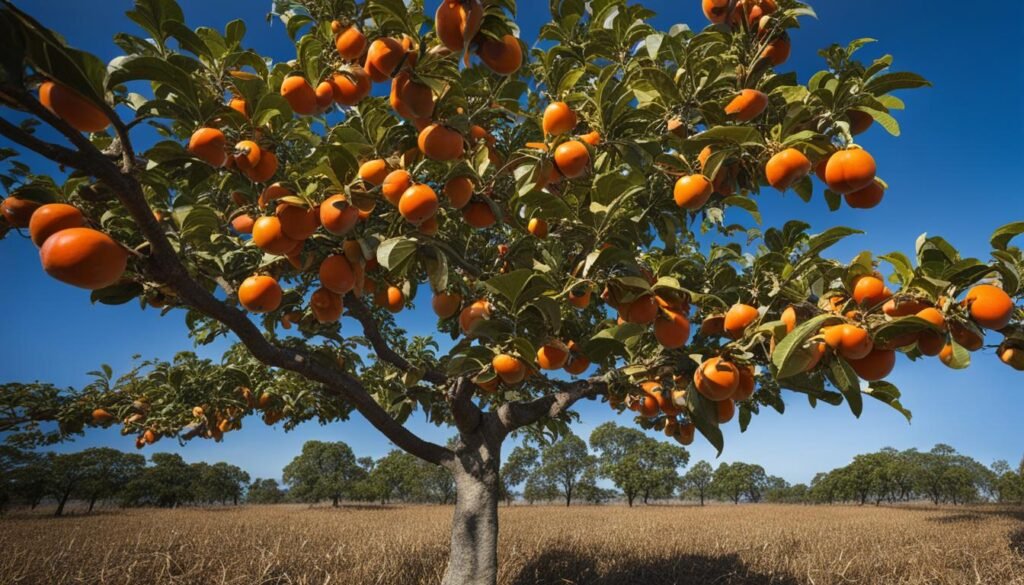Persimmon trees have long been used for their medicinal properties in various healthcare practices. From the leaves to the fruits, different parts of the persimmon tree offer a wide range of benefits that can support overall wellness. In this article, we will explore the extensive uses of persimmon trees in traditional and modern medicine, highlighting their potential therapeutic properties and health benefits.
Key Takeaways:
- Persimmon trees offer a wide range of potential health benefits.
- They have been valued for their medicinal properties for centuries.
- Persimmon tree leaves and fruits are rich in nutrients and antioxidants.
- They may promote digestive health, heart health, and blood sugar control.
- Persimmon trees may also support skin health, weight management, and brain health.
The Nutritional Value of Persimmon Trees
Persimmon trees are a powerhouse of nutrients, offering a wide array of health benefits. Whether it’s the leaves, fruits, or other parts of the tree, each component is packed with essential vitamins, minerals, antioxidants, and fiber.
| Nutrient | Benefits |
|---|---|
| Vitamins A, C, E, K, and B6 | Support immune function, promote healthy skin, and aid in cellular repair and growth. |
| Potassium | Helps regulate blood pressure and maintain proper heart function. |
| Copper | Assists in red blood cell production and iron absorption. |
| Manganese | Contributes to bone health and plays a role in metabolism. |
| Dietary fiber | Promotes digestive health, aids in weight management, and helps regulate blood sugar levels. |
Including persimmon trees in your diet can provide you with these valuable nutrients and contribute to your overall well-being. Whether enjoyed as a fresh fruit, incorporated into recipes, or consumed as an herbal remedy, persimmon trees offer a natural and nutritious way to support your health.

Table: Nutritional Composition of Persimmon Leaves and Fruits
| Nutrient | Persimmon Leaves | Persimmon Fruits |
|---|---|---|
| Fiber | High | Good source |
| Vitamins | Vitamins A, C, E, K, and B6 | Vitamins A and C |
| Antioxidants | Present | Moderate |
| Minerals | Potassium, copper, and manganese | – |
Table: Nutritional Composition of Persimmon Leaves and Fruits
Overall, persimmon trees offer a holistic approach to digestive health. The combination of dietary fiber, natural digestive aids, and beneficial compounds found in persimmon leaves and fruits contribute to their effectiveness in promoting a healthy digestive system.
Antioxidant and Anti-inflammatory Properties of Persimmon Trees
Persimmon trees are not only rich in essential nutrients, but they also possess powerful antioxidant and anti-inflammatory properties. These properties are attributed to the presence of flavonoids, polyphenols, and tannins in the tree’s leaves and fruits. These compounds help neutralize harmful free radicals in the body, reducing oxidative stress and preventing cell damage.
The antioxidants found in persimmon trees also exhibit anti-inflammatory effects. Inflammation is a natural response by the body to injury or infection, but chronic inflammation can lead to various health issues. The anti-inflammatory properties of persimmon trees can help reduce inflammation and alleviate symptoms associated with inflammatory conditions, such as joint pain and inflammation.
“The antioxidants in persimmon trees help neutralize harmful free radicals, reducing oxidative stress and preventing cell damage.”
Furthermore, the anti-inflammatory effects of persimmon trees can benefit overall health and well-being. Chronic inflammation has been linked to the development of chronic diseases, including cardiovascular disease, diabetes, and certain types of cancer. By incorporating persimmon leaves, fruits, or extracts into the diet, individuals may be able to reduce inflammation and lower their risk of developing these conditions.
The Antioxidant and Anti-inflammatory Effects of Persimmon Trees
Research has shown that the antioxidants and anti-inflammatory compounds in persimmon trees may have a range of health benefits. These include:
- Reducing the risk of chronic diseases such as cardiovascular disease, diabetes, and cancer.
- Alleviating symptoms associated with inflammatory conditions, such as joint pain and inflammation.
- Supporting healthy aging by protecting against oxidative damage and inflammation-related decline.
- Promoting overall wellness by reducing the impact of oxidative stress on the body.
It’s worth noting that while the antioxidant and anti-inflammatory properties of persimmon trees are promising, further research is needed to fully understand their mechanisms and potential therapeutic applications. However, incorporating persimmon leaves, fruits, or extracts into a balanced diet may provide a natural and delicious way to enhance overall health and well-being.

Persimmon Trees and Heart Health
Persimmon trees have long been associated with potential cardiovascular benefits. The compounds found in both the leaves and fruits of persimmon trees have shown promising effects on heart health. The presence of flavonoids in persimmon trees has been linked to a reduced risk of heart disease by lowering bad cholesterol levels and reducing inflammation in the blood vessels.
Flavonoids, such as quercetin and kaempferol, have antioxidant properties that help protect the heart from oxidative stress and damage. These antioxidants also contribute to the overall health of the blood vessels, promoting a healthy cardiovascular system. Consuming persimmon tree extracts or incorporating persimmon fruits into the diet can be a natural way to support heart health.
| Heart Health Benefits of Persimmon Trees |
|---|
| Lowering bad cholesterol levels |
| Reducing inflammation in blood vessels |
| Protecting the heart from oxidative stress |
| Promoting overall cardiovascular health |
It’s important to note that while persimmon trees may have potential heart health benefits, they should not replace any prescribed medications or treatments. Consulting with a healthcare professional is always recommended before making any changes to your healthcare routine.
Incorporating persimmon trees into a well-balanced diet can provide a delicious and nutritious way to support heart health. So why not enjoy the sweet and tangy flavor of persimmon fruits while reaping the potential benefits for your cardiovascular system?

Persimmon Trees and Blood Sugar Control
When it comes to maintaining stable blood sugar levels, persimmon trees have shown promise in aiding individuals with type 2 diabetes. Studies have highlighted the potential benefits of consuming persimmon tree extracts or incorporating persimmon fruits into the diet. These actions can play a role in regulating blood sugar levels and supporting overall metabolic health.
Persimmon leaves and fruits contain a high concentration of magnesium, which is believed to contribute to their blood sugar-controlling properties. Magnesium has been shown to help improve insulin sensitivity and reduce insulin resistance in individuals with diabetes. By incorporating persimmon trees into their healthcare routine, individuals may experience better blood sugar management and enhanced overall wellness.
To illustrate the significance of persimmon trees in blood sugar control, the following table highlights the key nutrients found in persimmon leaves and fruits:
| Nutrient | Persimmon Leaves | Persimmon Fruits |
|---|---|---|
| Magnesium | High | Significant |
| Vitamin C | Present | Abundant |
| Dietary Fiber | Rich | Good Source |
By incorporating persimmon trees into their healthcare routine, individuals with type 2 diabetes can potentially benefit from the blood sugar-controlling properties of magnesium, as well as the other essential nutrients found in persimmon leaves and fruits. However, it is always important to consult with a healthcare professional before making any changes to your diabetes management plan.

References:
- “Effects of Persimmon Leaf Extract Supplementation on Blood Glucose and Insulin Sensitivity in Subjects with Type 2 Diabetes” – A. E. Tominaga et al. (2011)
- “Effect of Persimmon (Diospyros kaki L.) Extract on Glycemic Control and Insulin Sensitivity in Healthy Subjects: A Randomized, Placebo-Controlled, Double-Blind, Crossover Study” – M. Yamauchi et al. (2019)
Persimmon Trees and Skin Health
Persimmon trees offer potential benefits for skin health and appearance. The antioxidants present in persimmon leaves and fruits can help protect the skin from oxidative damage and promote a youthful complexion. Persimmon tree extracts have been used in traditional medicine for treating skin problems such as acne and eczema, due to their anti-inflammatory properties. Additionally, persimmon tree extracts have been found to have photoprotective and anti-aging effects on the skin.
The antioxidants in persimmons, such as vitamin C and vitamin E, help neutralize free radicals that can damage the skin and accelerate the aging process. These antioxidants also support collagen production, which is essential for maintaining the skin’s elasticity and firmness. Regular consumption of persimmon tree extracts, or the application of persimmon-based skincare products, may help improve the skin’s overall health and appearance.
Furthermore, persimmons contain a compound called betulinic acid, which has been found to have potential anticancer properties. Research suggests that betulinic acid may inhibit the growth of cancer cells and promote their destruction. While further studies are needed to fully understand the anticancer effects of persimmon tree extracts, preliminary findings have shown promise in using persimmons as a natural remedy for certain types of cancer.
| Benefit | Description |
|---|---|
| Antioxidant Protection | Persimmon trees provide antioxidants that help protect the skin from oxidative stress and premature aging. |
| Anti-Inflammatory Effects | The anti-inflammatory properties of persimmon tree extracts can help soothe and calm irritated skin conditions like acne and eczema. |
| Photoprotective Properties | Studies suggest that persimmon tree extracts may provide protection against harmful UV radiation and help prevent skin damage caused by sun exposure. |
| Anti-Aging Benefits | The powerful antioxidants in persimmons may help reduce the appearance of wrinkles, fine lines, and other signs of aging. |
Overall, incorporating persimmon tree extracts or using persimmon-based skincare products may contribute to healthier, more radiant skin. However, it is essential to consult with a dermatologist or healthcare professional before incorporating new skincare products into your routine, especially if you have any existing skin conditions or sensitivities. Embrace the potential skin health benefits of persimmon trees and discover a natural approach to achieving a glowing complexion.
Weight Management and Persimmon Trees
Persimmon trees offer numerous benefits for weight management and overall wellness. The high fiber content found in persimmon leaves and fruits promotes satiety and helps regulate appetite, making it easier to maintain a healthy weight. Additionally, persimmon trees possess liver-cleansing properties that support improved metabolism and aid in the breakdown of fats. By including persimmon leaves and fruits in a balanced diet, individuals can contribute to a comprehensive weight management plan.
Research has shown that the consumption of persimmon trees can play a significant role in supporting weight loss efforts. The fiber-rich composition of persimmon leaves and fruits helps individuals feel fuller for longer periods, reducing the likelihood of overeating and unnecessary snacking. Furthermore, the liver-cleansing properties of persimmon trees can optimize metabolic function, enhancing the body’s ability to efficiently process and burn calories.
Incorporating persimmon trees into a weight management routine not only aids in calorie control but also offers essential nutrients necessary for overall wellness. The rich vitamin and mineral content of persimmon leaves and fruits promotes optimal health while supporting weight loss. By harnessing the power of persimmon trees, individuals can achieve their weight management goals while nourishing their bodies with beneficial nutrients.
| Benefits of Persimmon Trees for Weight Management |
|---|
| 1. High fiber content promotes satiety and reduces appetite |
| 2. Liver-cleansing properties optimize metabolic function |
| 3. Essential vitamins and minerals support overall wellness |

The Role of Fiber in Weight Management
Fiber plays a crucial role in weight management as it adds bulk to the diet without adding unnecessary calories. Persimmon leaves and fruits are excellent sources of dietary fiber, which helps individuals feel fuller for longer periods and reduces the frequency of snacking. By incorporating persimmon trees into their diet, individuals can effectively manage their weight while enjoying a variety of delicious and nutritious options.
Persimmon Trees and Brain Health
Persimmon trees have long been recognized for their potential benefits in promoting brain health and cognitive function. The leaves and fruits of persimmon trees contain key compounds such as lutein, zeaxanthin, and fisetin, which possess antioxidant and anti-inflammatory properties that support optimal brain function.
Including persimmon tree herbal remedies or incorporating persimmon fruits into your diet can contribute to maintaining cognitive function as you age.
The Antioxidant Power of Persimmon Trees
The antioxidants found in persimmon trees are particularly beneficial for brain health. Oxidative stress and inflammation play a significant role in the development of age-related cognitive decline and neurodegenerative diseases. The antioxidants present in persimmon trees help neutralize harmful free radicals and reduce inflammation, protecting the brain from damage and promoting overall cognitive health.
“The antioxidants in persimmon trees help neutralize harmful free radicals and reduce inflammation, protecting the brain from damage and promoting overall cognitive health.”
Persimmons and Cognitive Function
Research suggests that consuming persimmon fruits or products derived from persimmon trees may have a positive impact on cognitive function. The presence of lutein, zeaxanthin, and fisetin in persimmons has been associated with improved memory, attention, and overall cognitive performance. These compounds have been found to support brain health by reducing oxidative stress, promoting neuronal communication, and enhancing neuroplasticity.
Considerations and Further Research
While persimmon trees show promise in promoting brain health, further research is needed to fully understand their specific mechanisms of action and dosage recommendations. It’s always important to consult with a healthcare professional before incorporating any herbal remedies or supplements into your healthcare routine, particularly if you have any underlying medical conditions or are taking medication.
Conclusion
Persimmon trees have a long history of use in traditional medicine and offer a wide range of potential health benefits. These trees have been valued for their medicinal properties for centuries and are known to promote digestive health and support heart health.
Incorporating persimmon leaves, fruits, extracts, or herbal remedies into your healthcare routine may provide significant health benefits. However, it is important to consult with a healthcare professional before adding any new herbal remedies or supplements to your regimen.
Harness the power of persimmon trees and explore the medicinal uses they have to offer for your overall wellness. Incorporating persimmon into your diet or trying out persimmon tree remedies may support your journey towards optimal health.
FAQ
What are the medicinal uses of persimmon trees in healthcare?
Persimmon trees have long been used in traditional and modern medicine for various purposes, including promoting digestive health, reducing inflammation, supporting heart health, aiding in blood sugar control, improving skin health, aiding in weight management, and supporting brain health.
What nutrients are found in persimmon trees?
Persimmon trees are rich in vitamins A, C, E, K, and B6, as well as potassium, copper, manganese, dietary fiber, flavonoids, polyphenols, tannins, magnesium, lutein, zeaxanthin, and fisetin.
How do persimmon trees benefit digestive health?
The high fiber content in persimmon leaves and fruits helps regulate bowel movements and prevent constipation. Persimmon tree herbal remedies have also been used to relieve digestive issues such as diarrhea and indigestion.
What are the antioxidant and anti-inflammatory properties of persimmon trees?
Persimmon trees contain antioxidants such as flavonoids, polyphenols, and tannins, which help neutralize harmful free radicals and reduce oxidative damage in the body. These antioxidants also possess anti-inflammatory properties that can help reduce inflammation and alleviate symptoms associated with inflammatory conditions.
How do persimmon trees support heart health?
Compounds found in persimmon trees, such as flavonoids, have been linked to lowering blood pressure and cholesterol levels. These properties can contribute to overall heart health and support a healthy cardiovascular system.
Can persimmon trees aid in blood sugar control?
Persimmon trees contain a high concentration of magnesium, which is believed to play a role in regulating blood sugar levels. Consuming persimmon tree extracts or incorporating persimmon fruits into the diet can help maintain stable blood sugar levels and support overall metabolic health.
How do persimmon trees benefit skin health?
The antioxidants present in persimmon leaves and fruits help protect the skin from oxidative damage and promote a youthful complexion. Persimmon tree extracts have also been used in traditional medicine for treating skin problems such as acne and eczema, due to their anti-inflammatory properties.
Can persimmon trees aid in weight management?
The high fiber content of persimmon leaves and fruits can promote satiety and help regulate appetite, making it easier to maintain a healthy weight. Additionally, the liver-cleansing properties of persimmon trees can support improved metabolism and aid in the breakdown of fats.
How do persimmon trees support brain health?
Persimmon leaves and fruits contain compounds such as lutein, zeaxanthin, and fisetin, which may help protect the brain against cognitive decline and age-related diseases. These compounds have antioxidant and anti-inflammatory properties that support brain health and maintain cognitive function as we age.




